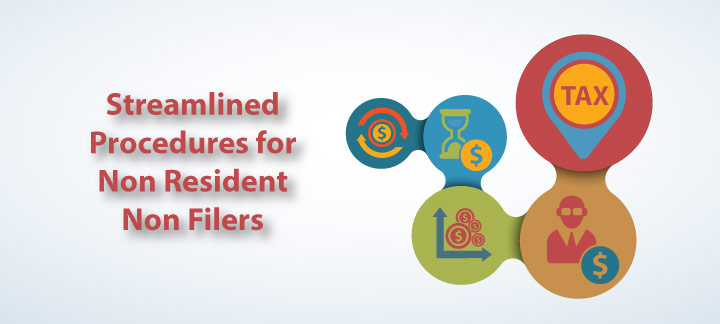Streamlined Procedures for Non-Resident Non-Filers
Some U.S. taxpayers living abroad may be unaware of their international tax duty to file U.S. tax returns and FBAR forms. If a taxpayer has failed in this regard, but has recently become aware of his or her obligation to make these filings, the IRS provides a special program to allow these individuals to come into compliance. The program consists of streamlined procedures for non-resident non-filers.
Who Qualifies for the Non-Resident Non-Filer Program?
The Non-Resident Non-Filer program is available to U.S. citizens and residents who are living abroad and have certain filing requirements with the IRS, including the requirement to file a U.S. tax return and an FBAR form. These new procedures for non-residents also include dual citizens who have not filed U.S. income tax and information returns (1). The program is available to non-resident U.S. taxpayers who have lived outside of the U.S. since January 1, 2009, but failed to file the requisite tax returns during the time period. In general, this program has been designed for those U.S. taxpayers who present a low risk of non-compliance.
Description of the Streamlined Procedures for Non-Resident Non-Filers
In order to utilize the streamlined procedures available for non-resident non-filers, qualifying taxpayers must file delinquent tax returns and any related informational returns for the last three years. In addition, the taxpayer must file required FBAR forms for the past six years. When filing the delinquent tax returns, any payment of tax associated with those returns must be remitted at the same time (2).
Once taxpayers submit the information required under the streamlined procedures, all submissions will be reviewed by the IRS. The depth of the review performed will vary depending on whether the IRS determines the taxpayer to be at a high or low risk for noncompliance. If the IRS determines that a taxpayer is a low compliance risk, the review will be expedited and the IRS will generally avoid assessing penalties or pursue further action against the taxpayer. In contrast, if the taxpayer is a high compliance risk, the taxpayer will be deemed ineligible to participate in the streamlined procedures. Instead, the high risk taxpayer will be subjected to a more thorough review and may need to participate in the Offshore Voluntary Disclosure Program (Link to one of our articles about OVDP) (3).
Compliance Risk Determination for the Streamlined Non-Resident Non-Filer Program
In order to qualify for the streamlined non-resident non-filer program, the IRS must determine that a taxpayer poses a low risk for noncompliance. In order to determine whether a taxpayer presents a low or high compliance risk, the IRS will balance a number of different factors and considerations.
How Does the IRS Make the Compliance Risk Determination?
The IRS will determine a taxpayer’s compliance risk based on information and materials submitted with the streamlined program application. This means that the IRS will evaluate the tax returns filed by the taxpayer, as well as any information returns and FBAR filings. As a general rule, taxpayers whose tax due is less than $1,500 in each year will almost automatically be considered low risk. Absent other contravening factors, such taxpayers will be treated as low risk and will be able to proceed through the streamlined process (4).
The IRS will also base the determination on the responses to a questionnaire completed by the taxpayer as part of the streamlined non-resident non-filer program submission (5). The Questionnaire requires the taxpayer to answer yes-or-no questions about the amount of tax owed and unpaid, any adjustments being made to the tax return through an amended tax return, the existence of foreign financial accounts or retirement funds, and whether the tax return was completed by an official tax preparer.
What Factors May Cause the Risk Determination to Rise?
The risk level may rise when certain factors are present. If the taxpayer shows significant U.S. economic activity, has not declared all income in his or her country of resident, has financial interest or authority over a financial account located outside his or her country of resident, has U.S. source income, the IRS will consider the risk level to be high. The risk level increases if the taxpayer is currently under IRS audit or investigation by the IRS. The existence of outstanding FBAR penalties or a warning letter sent to the taxpayer can also cause the compliance risk level to rise. Finally, if there are indications of sophisticated tax planning or avoidance, the IRS will assign a higher risk level to the taxpayer.
How a Tax Attorney Can Help with Streamlined Non-Resident Non-Filer Program
If you are a non-resident U.S. taxpayer and you have failed to make required tax return and information return filings, then you may be eligible to use the new streamlined procedures in order to come into compliance with U.S. tax laws.
The Tax Tax Lawyer - William D. Hartsock has been successfully helping clients comply with U.S. International Tax Laws and deal with issues related to worldwide taxation since the early 1980s. Mr. Hartsock offers free consultations with the full benefit and protections of attorney client privilege to help people clearly understand their situation and options based on the circumstances of their case. To schedule your free consultation simply fill out the contact form found on this page, or call (858) 481-4844.
Resources:
- IRS, Instructions for New Streamlined Filing Compliance Procedures for Non-Resident, Non-Filer U.S. Taxpayers, http://www.irs.gov/uac/Instructions-for-New-Streamlined-Filing-Compliance-Procedures-for-Non-Resident-Non-Filer-US-Taxpayers.
- IRS, Instructions for New Streamlined Filing Compliance Procedures for Non-Resident, Non-Filer U.S. Taxpayers, http://www.irs.gov/uac/Instructions-for-New-Streamlined-Filing-Compliance-Procedures-for-Non-Resident-Non-Filer-US-Taxpayers.
- Offshore Voluntary Disclosure Program, http://www.irs.gov/uac/IRS-Announces-Efforts-to-Help-U.-S.-Citizens-Overseas-Including-Dual-Citizens-and-Those-with-Foreign-Retirement-Plans.
- Internal Revenue Service, http://www.irs.gov/uac/Instructions-for-New-Streamlined-Filing-Compliance-Procedures-for-Non-Resident-Non-Filer-US-Taxpayers.
- Questionnaire for the Streamlined Non-Resident Non-Filer Program, http://www.irs.gov/pub/irs-utl/non-resident_questionnaire.pdf.



Comments (0)